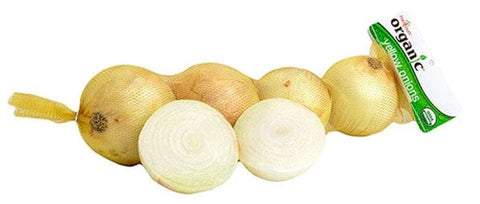All About Onions

Have you noticed the changes in your produce department as we move into summer? Organic stone fruit, melons, cherries, berries, corn and onions? Yep, onions! While they may not be as flashy or mouthwatering, fresh crop onions are in season and in abundance—and the time of year that you buy onions does make a difference in the flavor you experience, however you like to use them!
Spring and early summer onions tend to have more moisture and can be a bit sweeter than fall onions, which is due to the varieties that are grown and when they are picked. That means the onions you top your Father’s Day chili or hot dogs with will be a little milder and easier on the palate. It also means you may hear tales of someone saying they could eat organic Vidalia onions like an apple. Now, I love onions, but I'm not sure I'd go that far.
It also comes down to light. You and I may need 8 hours of sleep to be productive, but not onions—they want light! Most require 12 hours of daylight or more before they can produce their bulbs. Yellow storage onions (the ones you eat in the fall and throughout the winter) require the most sun; at least 14-16 hours a day. During these long days, high concentrations of sulfuric compounds like pyruvic acid develop, which helps make these onions good keepers (and good for you). They also develop allicin, the same antibiotic compound found in garlic.
We all have a relationship with onions. Some people like the flavor they add to a meal but not the texture; others like myself enjoy them all year round, but especially at this time of year.
Melissa's own Cheryl Forberg fondly remembers French onion soup growing up in Minnesota. A good friend of mine finds a reason to put caramelized onions on just about any savory dish, and a fellow organic produce colleague got giddy on the phone the other day at the thought of making blooming onions with the new crop of sweet onions that had just arrived.
Another great thing about onions this time of year is that they are easier on your eyes when you chop them. That said, if you like onions but don’t like the pain that can come with pungent onions and their eye-watering effects, try the following tips:
Use a sharp knife for the cleanest cut and try chilling your onions (or even store them in the fridge) before chopping to reduce their volatility. Peeling them under cool running water may also help. The root end of onions contains the majority of the sulfuric compounds, so leave this on till the end of chopping and you may not cry at all. If nothing else works, try wearing goggles!
While chopping brings out volatile compounds, cooking diminishes their effect and brings out the sweetness. All this talk of early summer onions has inspired me to break out the grill and add some of these tasty bulbs to the dinner plan.

